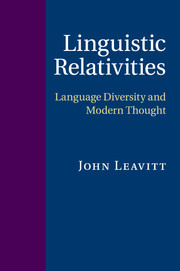Book contents
- Frontmatter
- Contents
- Preface
- Introduction
- 1 A passage to modernity
- 2 One reason, one world, many monads
- 3 The world at war with reason: Britain and France in the eighteenth century
- 4 Multiplicity and the Romantic explosion
- 5 Essences and universals through the nineteenth century
- 6 Boas and the linguistic multiverse
- 7 Linguistic relativity: Sapir, Lee, and Whorf
- 8 The other side of the mirror: a twentieth-century essentialism
- 9 The rise of cognition and the repression of languages
- 10 The return of the repressed
- Conclusion
- Notes
- References
- Index
1 - A passage to modernity
Published online by Cambridge University Press: 04 April 2011
- Frontmatter
- Contents
- Preface
- Introduction
- 1 A passage to modernity
- 2 One reason, one world, many monads
- 3 The world at war with reason: Britain and France in the eighteenth century
- 4 Multiplicity and the Romantic explosion
- 5 Essences and universals through the nineteenth century
- 6 Boas and the linguistic multiverse
- 7 Linguistic relativity: Sapir, Lee, and Whorf
- 8 The other side of the mirror: a twentieth-century essentialism
- 9 The rise of cognition and the repression of languages
- 10 The return of the repressed
- Conclusion
- Notes
- References
- Index
Summary
If I may be so bold as to try to characterize our own lived universe, which seems to have come fully into being in the sixteenth and seventeenth centuries: this is a world of infinite static three-dimensional space and eternal, constantly flowing, one-dimensional time: both of these are measured in terms of quantity (miles, years), not in terms of differential qualities. Things and people exist within this fixed and uniform spatiotemporal frame, which is very big. What we see when we look up on a clear night is vast or perhaps infinite space, with the stars shining so far away that thinking about it gives us a sense of flying rather than of locating, of losing orientation rather than gaining it. We live on a more or less spherical planet, one among a number that circle one such star, which looks bigger than the other stars because it is much closer to us than they are. Things in this world follow immutable natural laws, but in such a way that personal experience is highly varied and often surprising. “Things” include human bodies, but not the human mind. On the contrary, each human being is a unique individual whose appearance and actions give clues to the mind “underneath,” which constitutes the real person. Individuals are born free and should, within limits, control their own lives.
- Type
- Chapter
- Information
- Linguistic RelativitiesLanguage Diversity and Modern Thought, pp. 16 - 29Publisher: Cambridge University PressPrint publication year: 2010



